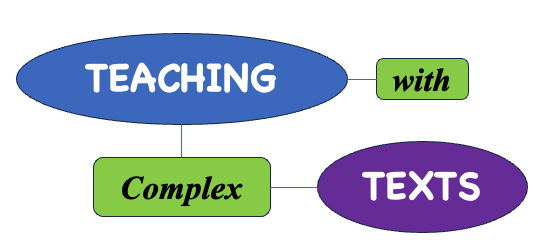Teaching With Challenging, High-Quality Text

All students across all grades should be provided access to complex, grade-level texts that offer opportunities to develop academic language (vocabulary and syntactic awareness) and acquire knowledge about the world, both of which contribute to development of reading comprehension. High academic expectations for all students using challenging text is an important way to support students from multiple ethnic, linguistic, and cultural backgrounds.
Students should engage with complex text regularly by reading or listening. In the younger grades, this happens primarily through read-alouds. As students move through the grades, they should read increasingly complex grade-level text on their own, with scaffolds provided for students who need assistance.
It is important to keep in mind that engaging with complex text is not leveled instruction using leveled readers. With leveled instruction, a student is only assigned books (called leveled readers) that are at that student’s reading level. These texts are designed to provide easy access to text at the word recognition level. However, if students who do not have grade-level skills are limited to leveled readers, they do not have sufficient exposure to the rich, complex text that is needed to grow vocabulary, develop proficiency with reading, understand complex sentences, and acquire background knowledge.
Developing Vocabulary and Background Knowledge Through High-Quality Text
Background knowledge is a critical component of comprehension. Knowledge about the content in text students are reading (or listening to during read aloud) provides a scaffold for learning, enabling them to deepen their existing knowledge, better retain new ideas and knowledge from the text, and grow vocabulary knowledge.
Growing Vocabulary: Engaging with complex text is an important classroom activity to build vocabulary. Vocabulary knowledge is intimately linked to conceptual knowledge. “Big ideas and complex questions cannot be separated from the language used to represent them… A reader’s comprehension of a story depends greatly upon the knowledge and language she brings to the experience.” Explicit vocabulary instruction often occurs at the beginning of a lesson, before reading the text. Selecting high-value words to teach that recur throughout a topic or text set is an effective approach for vocabulary development (Lesaux & Russ Harris, 2015).
Building Schema: A schema is a mental map that represents and organizes one’s understanding of a particular topic. Any topic that you’ve built a strong schema around is much more likely to “catch” similar applicable knowledge (i.e., it provides a hook on which to hang new, related information). Students use their schema and the associations within it to help make inferences and to resolve ambiguity in what they read. The use of complex text helps students expand their knowledge and build larger, more connected schemas and the vocabulary associated with them.
Explicit Instruction When Using Challenging Text
It is important to remember that students will need explicit instruction in comprehension strategies, critical thinking, and strategies for determining the meaning of unfamiliar words when presented with complex text. They will also need assistance from the teacher for making meaning from long, complex sentences that are often found in high-quality text. This explicit instruction should include modeling and think aloud as the teacher helps students analyze and determine the meaning of portions of text. Some students will need more assistance, especially those who struggle with basic reading skills, but these students deserve to have access to the content in high-quality text.
Opportunities for extended discussion about the text should be provided, driven by text-based questions for which students must go back into the text to find answers. And writing tasks that require students to write about the text should also be included.
What to look for to select high-quality, challenging text?
- Narrative texts tend to be more complex if they include subtle themes subject to interpretation, several narrators or points of view, challenging vocabulary and sentence structure, multiple settings, and challenging character dialogue.
- Informational texts tend to be more complex if they include several organization structures (e.g., description, sequence, cause and effect, compare and contrast), complicated connections among topics and ideas, text features with key information (infographics, charts, etc.), challenging vocabulary and sentence structure, and inferencing beyond what is stated in the text.
Here are some helpful questions to consider when planning complex text instruction:
- Does the lesson use high-quality, culturally relevant, complex texts and text sets that are rich in academic language and promote critical thinking?
- Does instruction give all students equitable access to grade-level texts, tasks, and experiences as well as the supports they need to meet high expectations?
- How does student discussion in whole-group and small groups using text-based questions move from literal to deeper and more inferential concepts, based on grade-level standards?
- How is background knowledge essential to understanding the text provided and previewed?
- How are students provided explicit vocabulary instruction and opportunities to hear and use new words?
Reference:
Lesaux, N. & Russ Harris, J. (2015). Cultivating knowledge, building language. Portsmouth, NH: Heinemann.
Related Resources:
- Article: Adams, M.J. (2010). Advancing Our Students’ Language and Literacy: The Challenge of Complex Texts. American Educator, Winter 2010-2011.
- Shanahan, T. (2020). Limiting Children to Books They Can Read: Why It Reduces Their Opportunity to Learn.( American Educator, Summer 2020
- Shanahan, T. (2008). 8 Ways to Help Kids Read Complex Textta (Reading Rockets)

 Joan Sedita is the founder of Keys to Literacy and author of the Keys to Literacy professional development programs. She is an experienced educator, nationally recognized speaker and teacher trainer. She has worked for over 35 years in the literacy education field and has presented to thousands of teachers and related professionals at schools, colleges, clinics, and professional conferences.
Joan Sedita is the founder of Keys to Literacy and author of the Keys to Literacy professional development programs. She is an experienced educator, nationally recognized speaker and teacher trainer. She has worked for over 35 years in the literacy education field and has presented to thousands of teachers and related professionals at schools, colleges, clinics, and professional conferences.
Leave a Reply